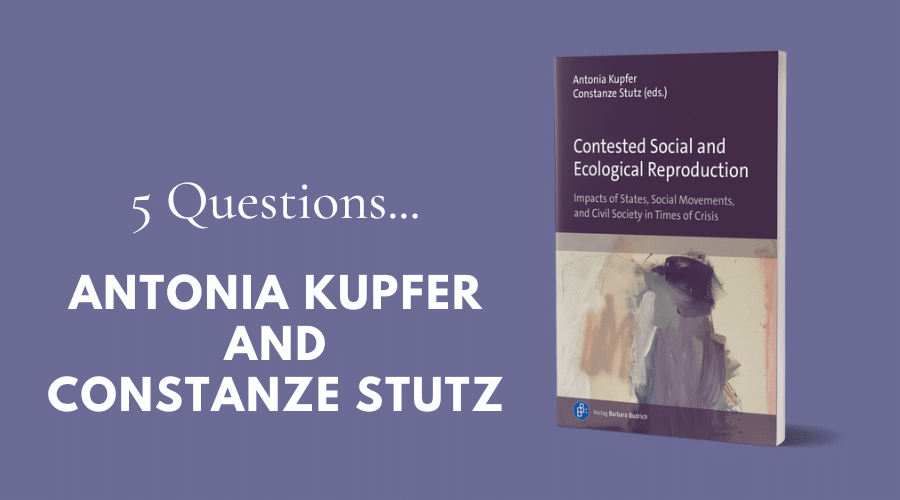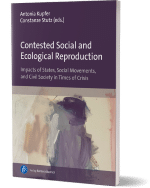We conducted an interview with Antonia Kupfer and Constanze Stutz, editors of the volume “Contested Social and Ecological Reproduction – Impacts of States, Social Movements, and Civil Society in Times of Crisis”. In this interview, we are asking about the background of the volume, how the idea came about and what is special about feminist movements.
Interview on “Contested Social and Ecological Reproduction – Impacts of States, Social Movements, and Civil Society in Times of Crisis”
Your anthology assembles contributions on social movements and struggles advocating for improved social, ecological, and reproductive conditions, as well as a reconfiguration of care relationships. What specific questions does the anthology address?
Although it is potentially possible, humankind has still not succeeded in securing the livelihood for all people. A major reason is the dominant global capitalist economy, based on the use and exploitation of nature. The contradiction between the possibility of a more egalitarian society and continuing social inequality appears to be growing. We ask the broad question why nothing – or not enough – is being done to secure the livelihoods of all people?
How did the idea for Contested Social and Ecological Reproduction come about?
Following our publication “Covid, Crisis, Care, and Change?” we wanted to further explore issues raised therein. We had begun this publication during the brief period when it seemed that, for example, increased visibility of women’s reproductive burdens in the household would lead to fundamental change in gender relations. We now know that this was not the case. On the contrary, we are witnessing increased crises jeopardizing the fundamentals of life worldwide. These crises put social and ecological reproduction in danger and are topics of struggles. So we wanted to know which actors are involved and think that transnational feminist and climate justice movements play a major role.
What are the main obstacles to social and ecological transformation? How do these differ across various countries or global regions?
Power relations securing privileges for some and maintaining social inequalities impede fundamental changes. A common way of dealing with the multiple crises are backlashes such as reducing human rights, imposing racist and sexist structures, and increasing repression against the ones questioning these policies. There is a wide range of responses across countries from openly suppressing women*, like in Iran and Afghanistan, to economic policies securing the wealth of upper middle classes in the Global North, accepting irreparable ecological damage worldwide.
What impact do transnational networks and international strike movements have on local political change?
This can be well exemplified by the history of the femi(ni)cide term. Coined in the early 1990s by Diana Russell and Jill Radford to analyse misogynist murders of women as part of patriarchal violence, the term was adopted and politically employed by South American feminist actors and movements. Through an engagement with these powerful feminist movements, the term has entered debates in Northern Europe, enabling a broad transnational politicization of violence against women.
Not least the Budrich anthology “Feminizide” shows this connection via traveling concepts: basic texts and analyses from Latin America are translated, made accessible, and brought into discussion.
What sets feminist movements apart from other social movements?
In recent years, an intensification of struggles around work and demands for the reorganization of care relations can be observed, along with international labour strikes and unrest in feminized employment sectors. In Germany, for example, a consolidation of labour struggles in this sector can be seen, beginning with the strike of nurses and physicians and other care workers of the Berlin Charité hospital in 2015. At the same time, transnational networks have collectively organized a powerful international feminist strike movement. These feminist strikes are united by an expanded concept of work and labour, which includes domestic and care work, as well as voluntary free labour. The social spheres and the subjects that are on strike can thus potentially expand. At the same time, we see a potential not to think of the liberal integration of women into the capitalist labour and commodity market as the end of feminist emancipation. Just as in the climate justice movement, the transnational feminist strike movement is searching for alternative ways to secure the livelihoods of all.
About Antonia Kupfer and Constanze Stutz

Prof. Dr. Antonia Kupfer is professor of Macrosociology at the Institute of Sociology at Technical University of Dresden in Germany.

Constanze Stutz, M.A. is working on her doctorate in sociology at the Institute for Social Research Frankfurt a. M. in Germany.
Order or download this book in our webshop
Contested Social and Ecological Reproduction.
Impacts of States, Social Movements, and Civil Society in Times of Crisis
edited by Antonia Kupfer and Constanze Stutz
More interview with our authors and editors can be found here.


